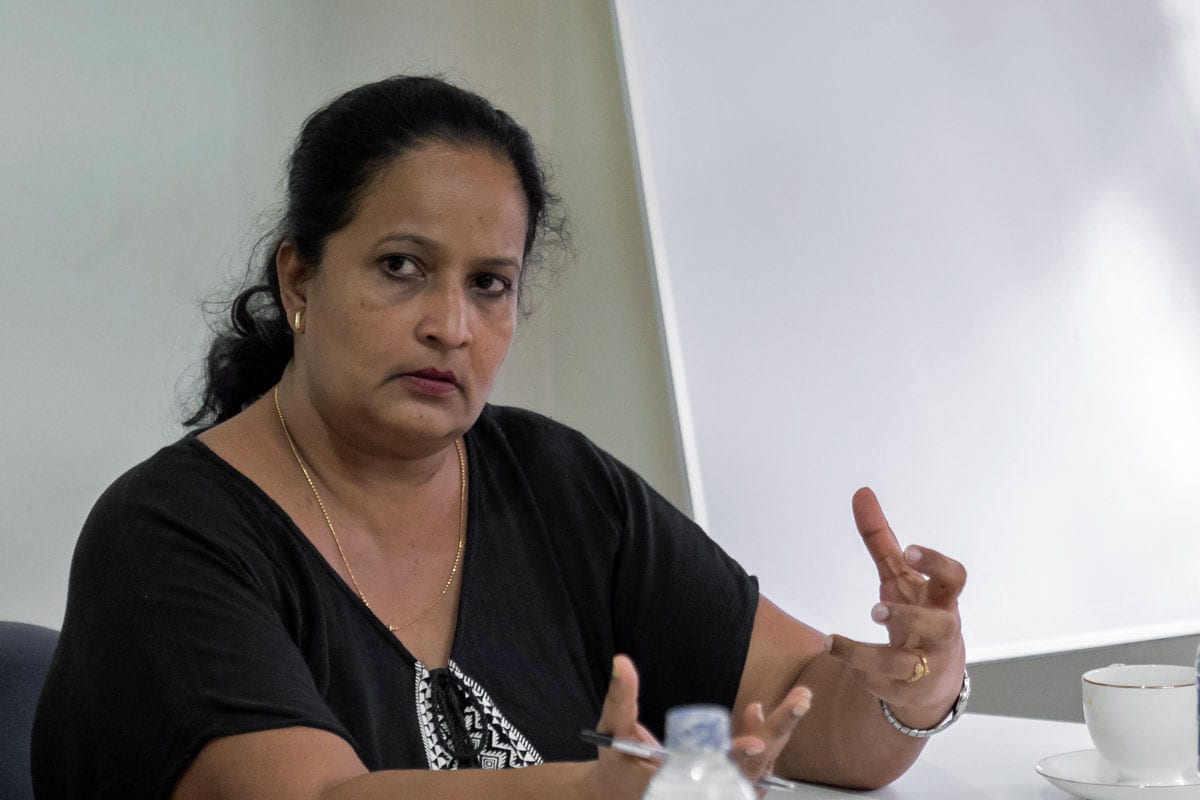
Jan 22, 2019
Just outside Sri Lanka’s Bandaranaike International Airport, where more than 2 million tourists start their vacations each year, a different reality unfolds in the Katunayake export processing zone (EPZ).
There, thousands of garment workers take their places in factories guarded by electrified fencing to begin long days for little pay, forced to endure grueling production cycles with managers refusing to grant even unpaid sick leave. Sexual harassment and other forms of gender-based violence are a daily part of the job, they say, often with economic repercussions.
“Women are made to stand and work and when engineers fix machines, they touch the women,” says PK Chamila Thushari, program coordinator for the Dabindu Collective union. “When they complain, engineers don’t fix the machines, which means they can’t meet their quota. The only they way they can earn a good living is to hit the targets set by the bonus,” she says, speaking through a translator.
Garment workers are paid a bare $84 a month—or less, if they are employed outside the EPZs—yet apparel exports generated $4.8 billion for Sri Lanka in 2017, a 3 percent increase compared with the previous year. At 47 percent of total exports in 2016, apparel and textiles are the backbone of the country’s trade.
Yet only 2.8 percent of the revenue comes to the garment workers who cut, sew and package clothes for international brands, says Thushari, and most are malnourished, suffer from anemia, and struggle to feed and educate their children. The cost of living for a family of four—without rent—is $549 a month in urban areas like Colombo, near the Katunayake EPZ.
Workers Fear Reporting Gender-Based Violence at Work
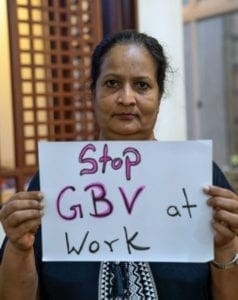
Gender-based violence in garment factories is so common “people have kind of become numb to it.” Credit: Solidarity Center/Sean Stephens
Dabindu (drops of sweat in Sinhalese), launched in 1984 as a local organization to advocate and promote women workers’ rights, transitioned to become a union last year at the request of its members, says Thushari, who has been with the organization for 22 years. In addition to advocating for improved wages, the union is focused on educating women about their rights to a workplace free of gender-based violence.
As is the case at workplaces around the world, Dabindu has found one of the biggest hurdles to addressing sexual harassment and other forms of gender-based violence is women’s fear of reporting it.
Also, “because this happens so often in garment factories, people have kind of become numb to it,” says Thushari. Dabindu creates awareness programs and trains workers to become leaders on the issue. Because workers are fearful of speaking to employers or the police about abusive incidents, the worker-leaders share their experiences with the union, which takes the information to factory management, multinational brands and others so they may address the problem.
Importantly, it took time for Dabindu to develop trust among the workers so they would feel comfortable sharing their experiences with the union, says Thushari.
Connecting Garment Workers Across the Country
Since the end of the country’s 26-year civil war in 2009, which claimed roughly 100,000 lives, Tamil women, many widowed, have journeyed from the north for employment in garment factories at Katunayake and other southern areas with Sinhala majorities. Many experience difficulties because they do not understand the language, and garment factories often require Tamil women to meet higher targets, says Thushari.
Dabindu is working to foster better understanding between the Sinhala and Tamil garment workers by holding daylong “youth camps,” bringing the women together in a relaxed setting, and also is sponsoring trips for garment workers to war-torn northern Sri Lanka to enable women see the difficult living conditions there that are driving Tamil women to seek employment far from their homes. The union is expanding its program to offer women in the north a chance to travel to the south.
“Sometimes, workers are in tears when they see the difficult living conditions, and that brings them closer to each other,” says Thushari.
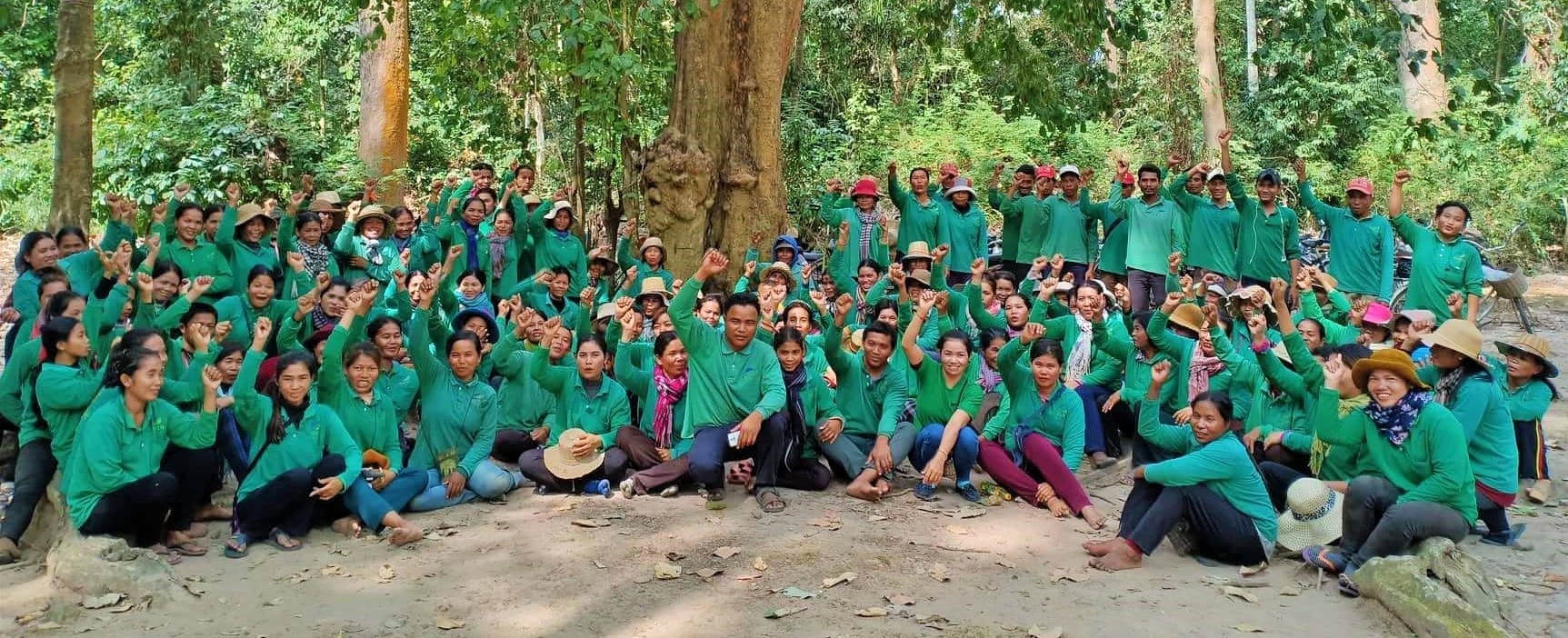
Jan 18, 2019
At Cambodia’s iconic Angkor Archaeological Park in Siem Reap, trash collectors employed by the contractor V-Green are back on the job with a boost in pay this week after 200 workers waged weeks-long lunchtime protests for better wages, safer working conditions and improved social protections like health care.
The company agreed to increase monthly wages by $15 in 2019 and $20 in 2020, which means “workers with the lowest wage could earn up to $120 [per month] next year,” local union president Tea Tuot told the Phnom Penh Post. The workers, most of whom are women, also will get a $25 per month pay boost if the agency governing the park renews the company’s contract in 2020, and additional increases in the following two years.
Tea, who says the company reassigned him to a worksite far from the union members, was returned to his previous position as part of the agreement.
After workers formed the Tourism Employees Union V-Green Co. (TEUVGC) in June 2018, they successfully pushed for a monthly wage increase from $71 to $80 and some social protections through the national social security system, including access to the national health care program and worker compensation benefits.
But further talks stalled late last year, and workers say the company began to retaliate against union activists, including Tea. The company has agreed to not impede union activity or retaliate against workers involved in the union.
Throughout the workers’ efforts to achieve justice on the job, the Solidarity Center provided the union, an affiliate of the Cambodian Tourism and Service Worker Federation (CTSWF), with legal and bargaining support.
Workers Don’t Share in Cambodia’s Booming Tourism Industry
Cambodia’s tourism sector earned $3.63 billion in revenue in 2017, an increase of 13.3 percent over the previous year. Yet workers collecting trash throughout the more than 400-acre site are not provided with protective gloves and face masks, exposing them to safety and health hazards like broken glass and hazardous chemicals. They also have little job security and were not paid overtime on Sundays and holidays as required by law.
In recent years, construction and restoration workers at the Siem Reap complexes also have sought to improve their poverty wages and highly dangerous working conditions, but like many workers in Cambodia, they face big hurdles when they seek to form unions and improve their working conditions, including retaliation, violence and even imprisonment, according to the International Trade Union Confederation (ITUC).
Cambodian workers have waged few strikes in recent years since passage of a 2016 labor law that significantly limits workers’ freedom to form unions and exercise their rights to collective bargaining and free assembly, and workers celebrating their victory at V-Green hope their victory bolsters’ similar workers’ struggles around the country.
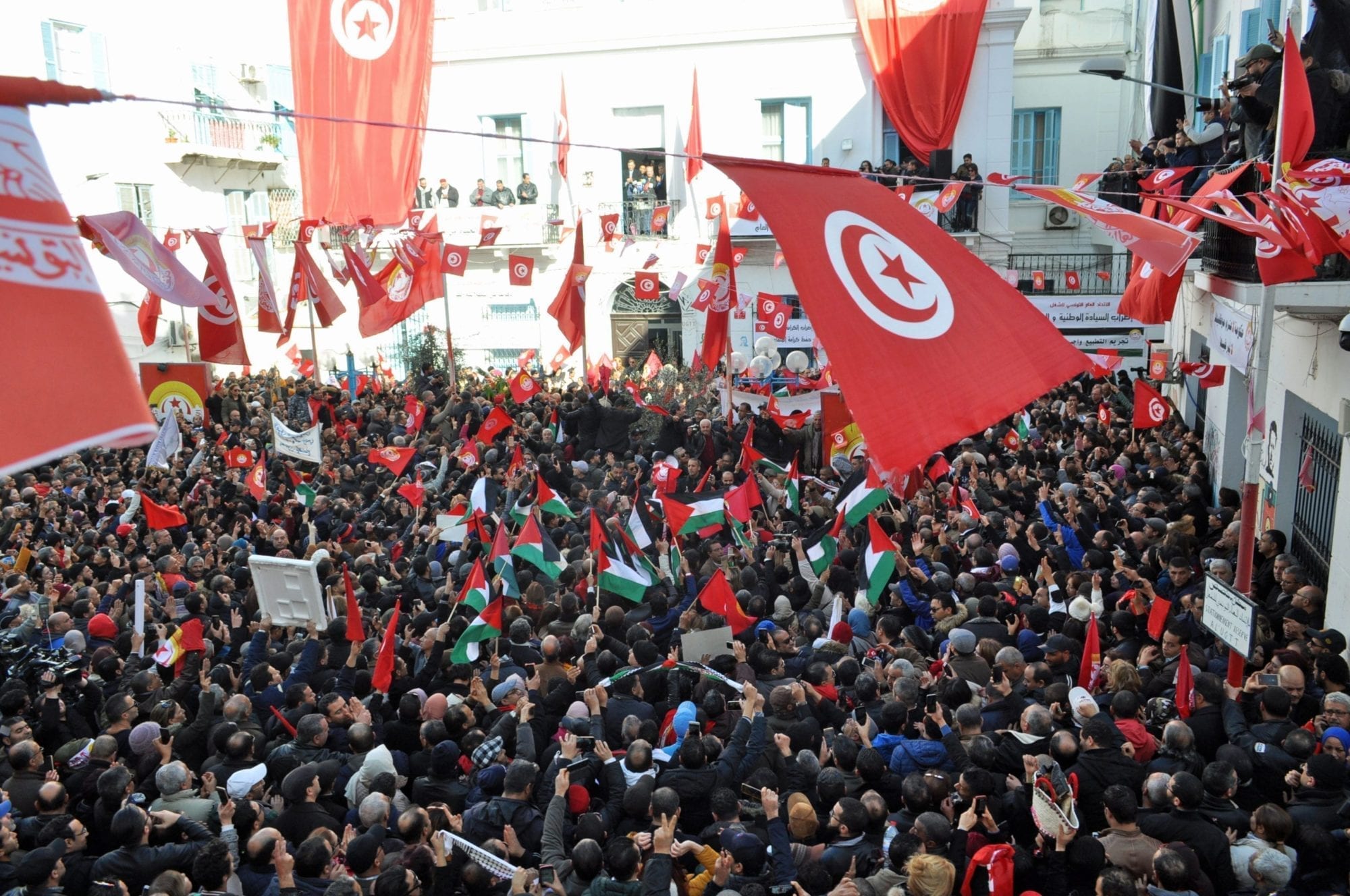
Jan 17, 2019
Some 670,000 workers in Tunisia waged a nationwide one-day strike today to protest the government’s refusal to increase wages for civil servant workers. The strike follows months of intense negotiations between the Tunisian General Labor Union (UGTT) and the government, which refused to increase wages in 2019 because of its commitment to the International Monetary Fund (IMF) to freeze public-sector wages and spending and balance the budget.
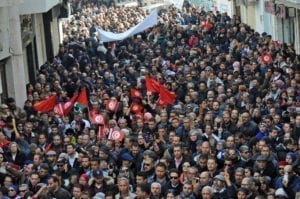
Hundreds of thousands of Tunisian workers pack the streets of Tunis for a one-day strike. Credit: UGTT
Workers began the strike at midnight. By morning, hundreds of thousands gathered at the UGTT headquarters in the capital, Tunis, and at regional offices across the country, rallying to cries of “We want employment, freedom, national dignity.” The UGTT says all public service workers took part in the strike, including workers from state-owned enterprises.
Public-sector wages have failed to keep up with rising prices, leading to a decline in purchasing power. The UGTT says the monthly minimum wage of about $128 is one of the lowest in the world, while Tunisia’s Institute of Strategic Studies says real purchasing power has fallen by 40 percent since 2014. The UGTT points out that private-sector workers have seen a 6 percent pay increase for 2019.
In addition, the government’s proposed $60 tax increase would severely impact workers’ wages, social security and the prices of consumer goods, UGTT Deputy General Sami Tahri said at a press conference yesterday.
Only one flight left the airport, and the strike affected ports, public transportation and central, regional and local administrations. Vital care at hospitals continued.
Tunisia struck a deal with the IMF in December 2016 for a loan program worth around $2.8 billion to address an economic crisis that includes high unemployment and stagnant wages. During negotiations with the UGTT, the government delegation withdrew many times to consult with the IMF, according to the global union IndustriAll.
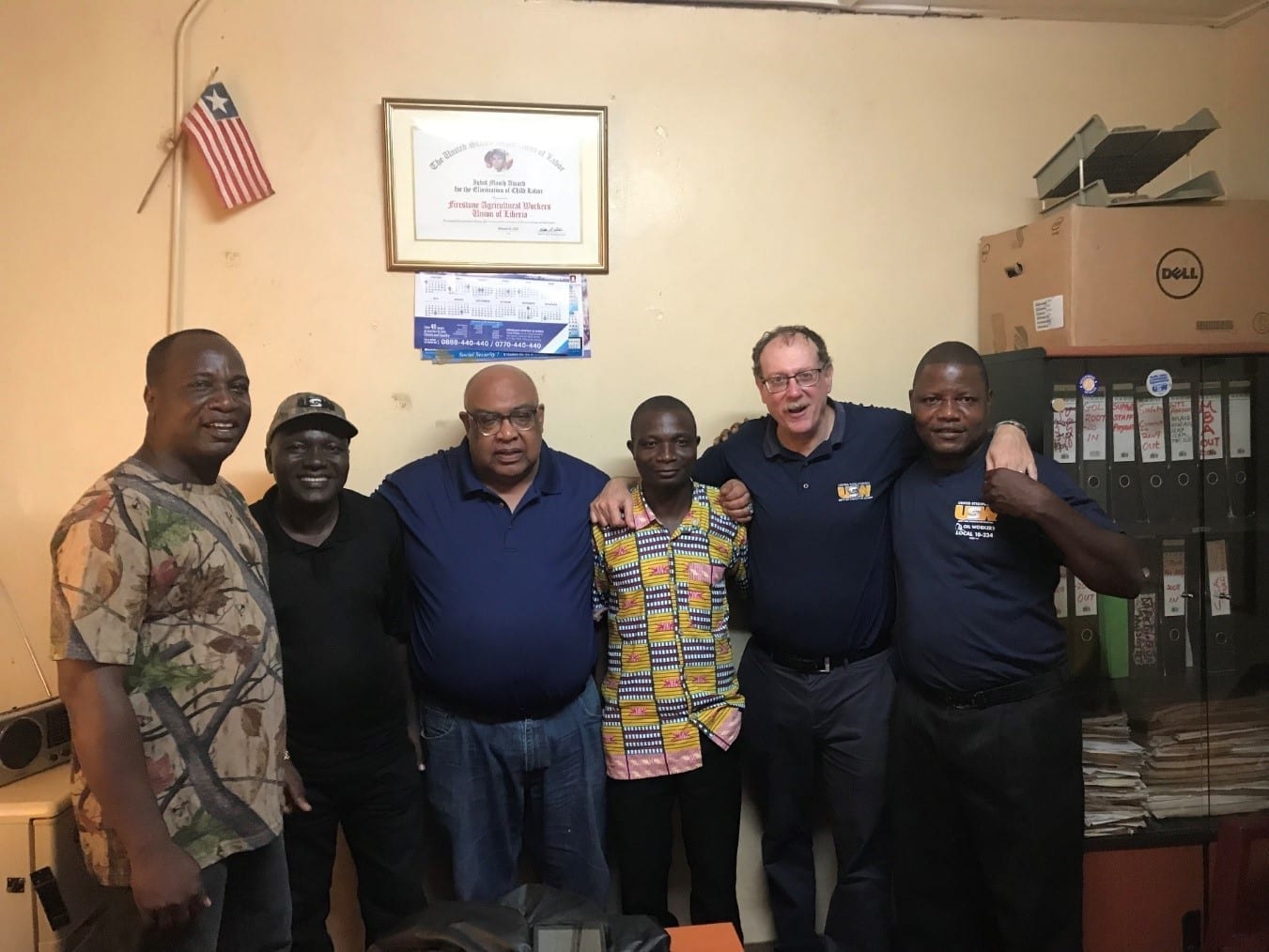
Jan 7, 2019
Benefiting hundreds of miners, forklift drivers and other workers, the United Workers Union of Liberia (UWUL) and ArcelorMittal Liberia (AML)—part of global steel giant ArcelorMittal group—signed their fourth labor contract in Monrovia December 14. The three-year contract includes a 14.5 percent wage increase over the duration of the contract as well as a sexual harassment clause to protect workers, especially women. The contract continues workers’ effort to close the wage gap between resident and expatriate workers, who can receive up to 10 times the salary for the same work.
“While these unions have very little in the way of material resources, they have shown themselves to be unstoppable when it comes to building union power and mobilizing their members,” says Fred Redmond, president of the United Steelworkers (USW), which supports organizing efforts with UWUL, a Solidarity Center ally.
According to Redmond, UWUL is having significant impact on workers in Liberia beyond its footprint through a “surge of organizing” at several new mining operations and—through a new contract—providing momentum for workers currently negotiating with Firestone Liberia and Golden Veroleum’s palm oil farms.
Two wildcat strikes broke out at an AML mine in Yekepa, Nimba County, earlier this year when workers protested low wages, wage theft, job insecurity, lack of healthcare, poor housing and lack of schooling for workers’ children. Members of the Liberia House of Representatives last month voted to audit AML to investigate its compliance with its Mineral Development Agreement (MDA) with the government of Liberia, which requires the company to establish and maintain medical and education facilities for employees, their families and the broader community, and to prioritize the employment and development of local Liberians.
AML ranks fifth in size of 25 ArcelorMittal mining companies worldwide. The company has about 300,000 employees in 60 countries around the world, including Brazil, Bosnia, Canada, France, Mexico, Ukraine and the United States.
In Liberia, the Solidarity Center and the USW partner with workers in key extractive industries such as mining, timber and rubber, as well as with domestic workers, to enable unions to better serve their members and organize additional workers. UWUL began organizing AML in 2008 with training and support from the Solidarity Center and USW, winning the right to represent workers in 2009. The workers’ first agreement with AML was negotiated in 2012.






